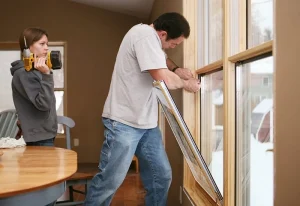Welcome to our informative article on the basics of residential window installation, part of our comprehensive series on home transformation.
In this article, we will explore the fundamental principles and techniques behind installing designer windows in residential properties. Whether you’re a homeowner looking to enhance your property’s aesthetic appeal or a construction professional seeking to expand your knowledge, this article will provide valuable insights.
We’ll cover important topics such as proper measurements, material selection, the installation process, common challenges, and maintenance tips.
Join us on this exciting journey of transforming your home through the installation of designer windows.
Key Takeaways
- Properly installed windows enhance the aesthetic appeal of a house.
- Residential window installation basics ensure windows are properly sealed, keeping out drafts, moisture, and noise.
- Well-installed windows provide increased security.
- Proper installation creates a comfortable and energy-efficient living environment.
Importance of Residential Window Installation Basics
The importance of residential window installation basics lies in the foundation it provides for a successful and long-lasting home transformation. When it comes to updating or renovating a home, installing new windows is a crucial step that should not be overlooked.
Not only do properly installed windows enhance the overall aesthetic appeal of a house, but they also offer numerous practical benefits. Residential window installation basics ensure that windows are properly sealed, keeping out drafts, moisture, and noise. This helps create a comfortable and energy-efficient living environment.
In addition, well-installed windows provide increased security, protecting the home and its occupants from intruders.
Common Challenges in Residential Window Installation
Common challenges often arise during residential window installation, requiring careful attention and expertise to overcome.
One common challenge is ensuring proper measurement and fit. Windows come in various sizes and dimensions, and it is crucial to accurately measure the opening to avoid gaps or improper alignment.
Additionally, the condition of the existing window frame can pose challenges. If the frame is damaged or deteriorated, it may need to be repaired or replaced before the new window can be installed.

Another challenge is dealing with unforeseen structural issues. During installation, it is possible to uncover problems such as rotting wood or uneven surfaces, which may require additional repairs.
Lastly, weather conditions can also impact the installation process. Rain, strong winds, or extreme temperatures can make the task more difficult and may require adjustments to the installation timeline.
Overcoming these challenges requires the knowledge and expertise of experienced professionals.
Key Steps for Successful Residential Window Installation
To ensure a successful residential window installation, it is essential to follow a series of key steps. These steps are crucial in order to achieve a seamless and efficient installation process. Here are the key steps for a successful residential window installation:
- Measure and assess: Before starting the installation, accurate measurements of the window opening should be taken. This will ensure that the new window fits perfectly and minimizes any gaps or drafts.
- Prepare the opening: The window opening should be thoroughly cleaned and prepped before installation. This includes removing any old caulk or debris, as well as making any necessary repairs to the surrounding area.
- Install the window: Carefully position the new window into the opening, ensuring it is level and plumb. Secure the window in place using shims and screws, making sure it is properly sealed and insulated.
- Finish and test: Once the window is installed, apply a new layer of caulk around the perimeter to provide a watertight seal. Finally, test the window to ensure it opens and closes smoothly and that there are no air leaks.
Choosing the Right Window Design for Your Home
When choosing the ideal window design for your home, it is crucial to consider factors such as architectural style, functionality, and energy efficiency.
The right window design can enhance the overall aesthetic appeal of your home while also providing practical benefits. One important consideration is the architectural style of your home. Different architectural styles have distinct window designs that complement the overall look and feel of the property.
Additionally, functionality is key. Consider how you intend to use the windows – do you want them to provide ample natural light, ventilation, or both?
Finally, energy efficiency is a growing concern for homeowners. Investing in windows that are energy-efficient can help reduce heating and cooling costs while also minimizing your carbon footprint.
Understanding the Benefits of Professional Installation
Professional window installation offers numerous benefits that can greatly enhance the overall outcome of your residential window project.
Here are four key benefits of hiring professionals for your window installation:
- Expertise: Professional installers have the knowledge and experience to handle all aspects of the installation process. They understand the intricacies of different window types and can ensure a precise and secure fit.
- Time and Cost Efficiency: By hiring professionals, you can save time and money in the long run. They have the necessary tools and equipment to complete the installation efficiently, minimizing any potential delays or mistakes that could lead to additional expenses.
- Quality Assurance: Professional installers prioritize quality and precision. They will ensure that your windows are properly sealed, insulated, and aligned, maximizing energy efficiency and reducing drafts and noise.
- Warranty Protection: Many reputable window manufacturers offer warranties that require professional installation for the coverage to be valid. By hiring professionals, you can ensure that your windows are installed correctly and be confident in the warranty protection they provide.
Maintenance Tips to Extend the Life of Your Residential Windows
Regular maintenance is essential for prolonging the lifespan of your residential windows. By following a few simple tips, you can ensure that your windows remain in optimal condition and continue to provide you with the benefits they were designed for.
First and foremost, regularly inspect your windows for any signs of damage or wear. This includes checking for cracks, leaks, or broken seals. If you notice any issues, it is important to address them promptly to prevent further damage.
Additionally, keep the window frames clean and free from debris to avoid potential damage or deterioration. Regularly clean the glass panes using a mild detergent and non-abrasive cloth. Avoid using harsh chemicals or abrasive materials that can scratch or damage the glass.
Lastly, lubricate the moving parts of your windows, such as hinges and tracks, to ensure smooth operation.
Frequently Asked Questions
Can I Install Residential Windows Myself, or Is Professional Installation Necessary?
Professional installation is recommended for residential window installation to ensure proper installation and optimal performance. While it may be tempting to attempt DIY installation, professional installers have the knowledge, experience, and tools necessary to ensure a seamless and efficient installation process.
They can also address any potential challenges or issues that may arise during the installation. By opting for professional installation, homeowners can have peace of mind knowing that their windows are installed correctly and will provide long-lasting durability and energy efficiency.
What Are the Different Types of Window Designs Available for Residential Homes?
There are various types of window designs available for residential homes, each offering unique features and aesthetic appeal. Some popular options include:
- Double-hung windows: These windows are versatile and offer excellent ventilation. They consist of two sashes that can be opened and closed independently.
- Casement windows: These windows provide unobstructed views as they have a single sash that opens outward. They are great for maximizing natural light and airflow.
- Sliding windows: These windows are easy to operate and require minimal maintenance. They have a sash that slides horizontally, making them a space-saving option.
- Awning windows: These windows are hinged at the top and open outward, creating an awning-like effect. They are ideal for providing ventilation even during light rain.
- Picture windows: These windows are fixed and do not open. They are perfect for showcasing beautiful outdoor views and allowing ample natural light into a room.
Each of these window designs has its own advantages and can be chosen based on the specific needs and preferences of homeowners.
How Can I Ensure That My Residential Window Installation Is Successful?
To ensure a successful residential window installation, there are several key factors to consider.
First, it is important to hire a professional and experienced contractor who specializes in window installations. They will have the knowledge and expertise to properly measure, fit, and install the windows.
Additionally, selecting high-quality windows and materials is crucial for long-lasting performance and energy efficiency.
What Are Some Common Challenges That Homeowners Face During Window Installation?
Common challenges that homeowners may face during window installation include:
- Improper measurement and sizing
- Difficulty in removing old windows
- Issues with structural integrity
- Potential for damage to surrounding walls and trim
Additionally, homeowners may encounter challenges with weather conditions, such as rain or extreme temperatures, which can impact the installation process.
It is important for homeowners to work with experienced professionals who can address these challenges and ensure a successful window installation.
What Maintenance Tips Can I Follow to Extend the Lifespan of My Residential Windows?
To extend the lifespan of your residential windows, there are several maintenance tips you can follow.
Firstly, regularly clean your windows using a mild detergent and warm water to remove dirt and grime.
Secondly, inspect the window frames and seals for any signs of damage or wear.
Additionally, lubricate the window hinges and tracks to ensure smooth operation.
Lastly, consider applying a protective coating or film to the windows to prevent damage from UV rays and harsh weather conditions.
Conclusion
In conclusion, understanding the basics of residential window installation is essential for homeowners and professionals in the construction industry.
By following proper measurements, selecting suitable materials, and following the step-by-step process, one can successfully install designer windows in residential properties.
Overcoming common challenges and seeking professional installation can further enhance the outcome.
Regular maintenance will also help extend the life of residential windows, ensuring both aesthetic appeal and functionality in the home.
You May Also Like:

